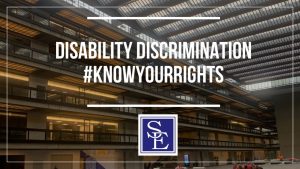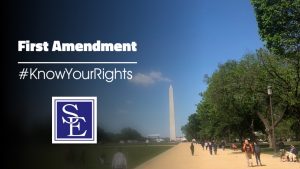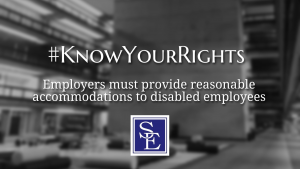As domestic travel numbers rise and airports are once again filled with travelers, airlines continue to struggle to comply with accommodations for travelers with disabilities. Most recently, a viral social media video by Bri Scalesse, who is wheelchair-bound, shows her horror and distraught emotion when informed that Delta Airlines severely damaged her wheelchair during the course of her flight from Minneapolis to Newark, NJ. Unfortunately, this isn’t an uncommon occurrence. In 2018, 36,930 disability-related complaints were made to airlines. Airlines were reported to have lost or broken 10,548 wheelchairs or scooters in 2019, more than 1 out of every 100 they handle.
 Under the Americans with Disabilities Act of 1990 (“ADA”), discrimination against people with disabilities in “public accommodations” is forbidden, including but not limited to an express list of the private entities that are considered public accommodations. The list includes all terminals, depots, or other stations used specifically for public transportation, like bus, rail, and ferry stations. Notably, the list specifically excludes aircraft stations. Individuals with disabilities are often subject to discrimination when flying, met with unnecessary barriers limiting their ability to travel comfortably. While trains, buses, and other forms of transportation are forced to comply with the Americans with Disabilities Act and create accommodations, planes have been specifically exempt from the ADA. This is contrary to New Jersey’s statutory discriminatory act, the Law Against Discrimination. The recent April 2021 judicial decision from Wright-Phillips v. United Airlines made clear that public places of accommodation for disability discrimination protections under the Law Against Discrimination to include airport terminals, gates, and planes. The court ruled that “the United flight represented a place of public accommodation… [and] because the statute extends to “terminals thereof,” the United gate at Newark Airport was a place of public accommodation, too. Liability under the NJLAD, however, applies to people, not places.”
Under the Americans with Disabilities Act of 1990 (“ADA”), discrimination against people with disabilities in “public accommodations” is forbidden, including but not limited to an express list of the private entities that are considered public accommodations. The list includes all terminals, depots, or other stations used specifically for public transportation, like bus, rail, and ferry stations. Notably, the list specifically excludes aircraft stations. Individuals with disabilities are often subject to discrimination when flying, met with unnecessary barriers limiting their ability to travel comfortably. While trains, buses, and other forms of transportation are forced to comply with the Americans with Disabilities Act and create accommodations, planes have been specifically exempt from the ADA. This is contrary to New Jersey’s statutory discriminatory act, the Law Against Discrimination. The recent April 2021 judicial decision from Wright-Phillips v. United Airlines made clear that public places of accommodation for disability discrimination protections under the Law Against Discrimination to include airport terminals, gates, and planes. The court ruled that “the United flight represented a place of public accommodation… [and] because the statute extends to “terminals thereof,” the United gate at Newark Airport was a place of public accommodation, too. Liability under the NJLAD, however, applies to people, not places.”
Under a federal scope, airplanes still fall under the Air Carrier Access Act (“ACAA”), which was passed four years prior to the ADA. The ACAA applies to all flights to, from, or within the United States. The ACAA prohibits airlines from discriminating against an otherwise qualified individual because the individual has a physical or mental impairment that substantially limits one or more major life activities. Physical impairments are defined as any condition relating to neurological, cardiovascular, or special sense organs, which affect major life activities consisting of manual tasks, physical health functions like breathing, speaking, or walking, and physical impairments.
 New Jersey Employment Lawyers Blog
New Jersey Employment Lawyers Blog




